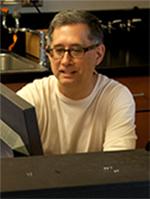Professor
[email protected]

Contact Information
| Mailing Address: |
513 Parnassus Ave, Clinical Sciences Bldg., C-18 San Francisco, CA, 94143-0665 |
| Academic Phone: | 415/502-8423 |
| Academic Fax: | 415/476-5623 |
Research/Clinical Interests
My research utilizes mass spectrometry as a tool to help solve biological problems at the molecular level. I am involved in many projects that center on identify proteins by generating amino acid sequence information from peptides using tandem mass spectrometry with collision induced dissociation. A large part of my research has focused on developing sample preparation techniques for making biological samples compatible with mass spectrometric analyses. Specifically, I have made significant contributions to developing a protocol that is used worldwide for the mass spectrometric identification of proteins isolated by 1D and 2D gel electrophoresis. In addition, I have made extensive contributions to research projects that utilize HPLC separation of complex biological mixtures. These projects involved interfacing high performance liquid chromatography instruments, on and off-line, to different types of mass spectrometers. Currently, my research continues along these lines but with a more focused emphasis on mass spectrometric applications to proteomics. Recent advances have been made in this field, namely mass spectrometric protocols for identification and relative and absolute quantitation of differentially expressed proteins using isobaric mass tags (iTRAQ) reagents or multiple reaction monitoring, respectively. While these methods have greatly expanded the potential for mining proteomes, their high cost prohibits their use in all but the most generously funded research laboratories. As a provider of mass spectrometry tools to the UCSF proteomics community, my current research centers on implementing and making these types of new technologies available through the Sandler-Moore Mass Spectrometry Core Facility.
In addition, I play a significant role in the National Cancer Institute's Clinical Proteomic Technology Assessment for Cancer (CPTAC) program. The principle goal of the CPTAC program is technology assessment (primarily mass spectrometry) for early detection of cancer. I currently lead the Experimental Design and Statistics Verification Studies Work Group for the CPTAC program that is composed of approximately thirty bioanalytical scientists and statisticians from UCSF, the Buck Institute for Age Research, the Broad Institute (Harvard/MIT), Purdue University, Vanderbilt University, Memorial Sloan Kettering Cancer Center, University of Washington at Seattle, New York University and the Fred Hutchinson Cancer Research Center. My responsibilities include leading this team towards defining performance characteristics of mass spectrometry-based proteomic measurement systems that includes incorporation of appropriate measurement assessment materials and reference standards, employing statistically designed approaches for the purpose of experimentally determining performance metrics using biologically and clinically relevant samples, and proposing plus evaluating experimental design strategies that employ statistical protocols to effectively analyze the results within and between the participating CPTAC sites.
Education/Training
| Year | Institution & Location | Degree | Field of Study |
|---|---|---|---|
| 1979 | Grinnell College, Grinnell, IA | B.A. | Chemistry |
| 1989 | Loyola University of Chicago, Chicago, IL | Ph.D. | Analytical Chemistry |
| 1992 | University of California, San Francisco, CA | Postdoc | Biological Mass Spectrometry |
